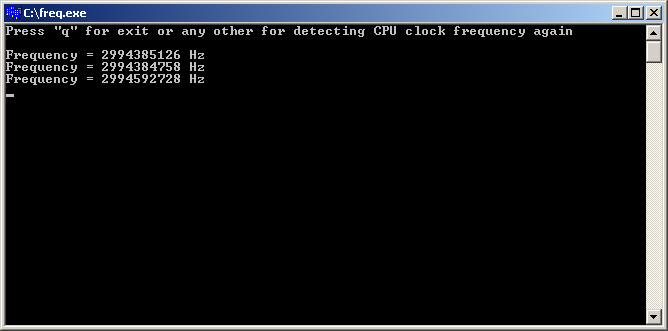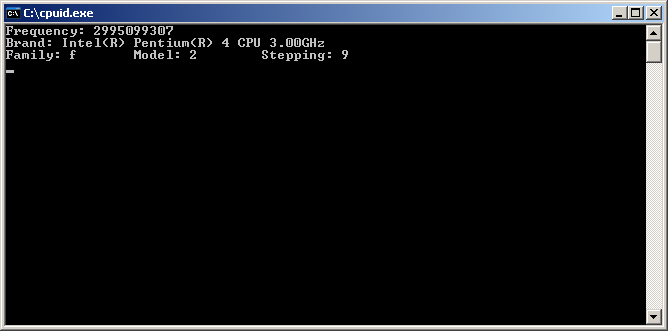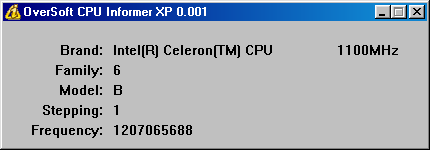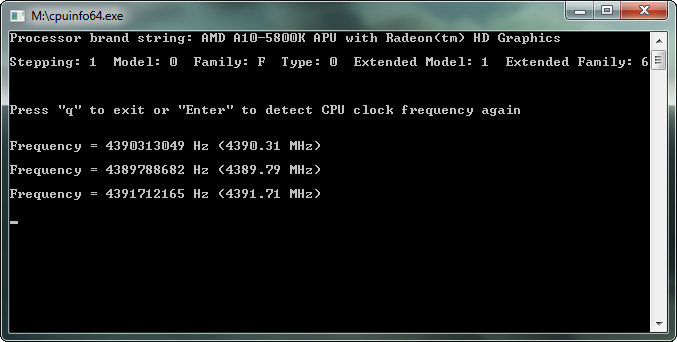I have a whole load of unfinished hobby projects. Many times I was taken by some idea, implemented the most challenging part and lost my interest.
But some of the projects have been actually finished and may be interesting to someone.
It’s time to let the world see my creations 🙂
The hero of the day is the small cross-platform utility that measures the clock speed of the CPU and shows it alongside its summary information, such as brand name, family, stepping, etc.
It started as a command-line application made in Borland C++ Builder. This IDE provides a straightforward and convenient syntax for embedding the x86 Assembler instructions into your regular C++ code. Which is great, when your application built around one of them: rdtsc.

Here’s the code (please take into account, that I was not professional or even amateur programmer back then, so give me some slack):
#include <stdio.h>
#include <conio.h>
#include <windows.h>
__int64 Get_freq() {
DWORD ts_hi, ts_lo;
LARGE_INTEGER qpf, count_1, count_2;
ULARGE_INTEGER ts_before, ts_after;
QueryPerformanceFrequency(&qpf);
__int64 count_persec = qpf.QuadPart;
asm {
rdtsc
push eax
push edx
}
QueryPerformanceCounter(&count_1);
while (count_2.QuadPart - count_1.QuadPart < count_persec) {
QueryPerformanceCounter(&count_2);
}
asm {
rdtsc
push eax
push edx
}
asm {
pop ts_hi
pop ts_lo
}
ts_after.HighPart = ts_hi;
ts_after.LowPart = ts_lo;
asm {
pop ts_hi
pop ts_lo
}
ts_before.HighPart = ts_hi;
ts_before.LowPart = ts_lo;
return ts_after.QuadPart - ts_before.QuadPart;
};
void main()
{
char ch;
printf("Press \"q\" for exit or any other for detecting CPU clock frequency again\n\n" );
ch = getch();
while (ch != 'q'){
printf("Frequency = %u Hz\n", Get_freq());
ch = getch();
}
}There was not so much information on this topic available except the MSDN library and Intel’s Instruction Set Reference. But Borland’s documentation was good enough too, as far as I remember.
In a few months, I ported this to the MS Visual C++. As you can see, the ASM instructions were replaced with the MSVC’s intrinsic functions. The clock frequency alone is not so exciting, so I added some basic processor information, that is returned by the cpuid instruction:

#include <windows.h>
#include <intrin.h>
#include <stdio.h>
int i;
int table[4];
unsigned __int64 nFreq;
void GetFreq() {
unsigned __int64 ts_before, ts_after;
LARGE_INTEGER count_persec, count_1, count_2;
QueryPerformanceFrequency(&count_persec);
ts_before = __rdtsc();
QueryPerformanceCounter(&count_1);
while (count_2.QuadPart - count_1.QuadPart < count_persec.QuadPart)
QueryPerformanceCounter(&count_2);
ts_after = __rdtsc();
nFreq = ts_after - ts_before;
};
int main() {
char c[3][16] = {0};
for (i = 2; i <= 4; i++) {
__cpuid(table, 0x80000000 | i);
memcpy(&c[i - 2], &table, 16);
}
__cpuid(table, 1);
int nStepping = table[0] & 0xF;
int nModel = (table[0] & 0xF0) >> 4;
int nFamily = (table[0] & 0xF00) >> 8;
GetFreq();
printf("Frequency: %u\n", nFreq);
printf("Brand: %s\n", c);
printf("Family: %x\t", nFamily);
printf("Model: %x\t", nModel);
printf("Stepping: %x\t", nStepping);
getchar();
}But this was just a preparation for the next step.
The final version of 2006 – GUI application made using the Windows 32 API aka WinApi:

// Включаем необходимый заголовочный файл для Windows-программ
#include <windows.h>
#include <intrin.h>
#include <string>
#include <stdlib.h>
int i;
int table[4];
char buff[16];
// CPU Information
std::string sBrand;
int nFamily;
int nModel;
int nStepping;
unsigned __int64 nFreq;
void GetFreq();
//----------------
void OnCreate(HWND, HINSTANCE);
WNDCLASS CreateClass(WNDPROC pfWProc, HINSTANCE hInst, LPCSTR sIcon, LPCSTR sCursor, LPCSTR sName, HBRUSH hbColor = (HBRUSH)12) {
WNDCLASS wc = {CS_HREDRAW | CS_VREDRAW, pfWProc, NULL, NULL, hInst, LoadIcon(hInst, sIcon), LoadCursor(NULL, sCursor), hbColor, NULL, sName};
return wc;
}
// Объявление функции окна (оконной процедуры)
LRESULT CALLBACK WndProc(HWND hWnd, UINT msg, WPARAM wParam, LPARAM lParam);
HINSTANCE hInst; // Идентификатор приложения
HWND Tab;
// Точка входа в программу - функция WinMain
int WINAPI WinMain(HINSTANCE hInstance, HINSTANCE hPrevInstance, LPSTR lpCmdLine, int nCmdShow)
{
HWND hWnd; // Уникальный идентификатор окна (handle)
MSG msg; // Объявление структуры типа MSG, для работы с сообщениями
hInst = hInstance; // Сохраняем идентификатор приложения
RegisterClass(&CreateClass(WndProc, hInst, MAKEINTRESOURCE(102), IDC_ARROW, "Form")); // Создаем и регистрируем оконный класс
RECT WorkArea;
SystemParametersInfo(SPI_GETWORKAREA, 0, &WorkArea, 0);
GetFreq();
// Создаем окно программы
hWnd = CreateWindow(
"Form", // Имя класса окна
"OverSoft CPU Informer XP 0.001", // Заголовок окна
WS_OVERLAPPED | WS_SYSMENU | WS_MINIMIZEBOX | WS_VISIBLE, // Стиль окна
WorkArea.right/2 - 215, WorkArea.bottom/2 - 75, // Горизонтальная и вертикальная позиции окна
430, 150, // Ширина и высота окна
NULL, // Хендл родительского окна
NULL, // Хендл меню
hInst, // Идентификатор приложения
NULL); // Дополнительные данные окна
UpdateWindow(hWnd); // Перерисовываем окно
// Стандартный цикл обработки сообщений
while(GetMessage(&msg, NULL, 0, 0))
{
TranslateMessage(&msg);
DispatchMessage(&msg);
}
return (int)msg.wParam;
}
// Оконная процедура
LRESULT CALLBACK WndProc(HWND hWnd, UINT msg, WPARAM wParam, LPARAM lParam)
{
switch(msg)
{
case WM_CREATE:
OnCreate(hWnd, hInst);
break;
case WM_DESTROY:
PostQuitMessage(0);
break;
default:
return DefWindowProc(hWnd, msg, wParam, lParam);
}
}
void GetBrandStr();
void GetId1();
void OnCreate(HWND hWnd, HINSTANCE hInst) {
GetBrandStr();
GetId1();
//GetFreq();
CreateWindow("static", "Brand:", WS_CHILD | SS_RIGHT | WS_VISIBLE, 20, 20, 80, 20, hWnd, NULL, hInst, NULL);
CreateWindow("static", sBrand.c_str(), WS_CHILD | SS_LEFT | WS_VISIBLE, 110, 20, 300, 20, hWnd, NULL, hInst, NULL);
CreateWindow("static", "Family:", WS_CHILD | SS_RIGHT | WS_VISIBLE, 20, 40, 80, 20, hWnd, NULL, hInst, NULL);
CreateWindow("static", CharUpper(_itoa(nFamily, buff, 16)), WS_CHILD | SS_LEFT | WS_VISIBLE, 110, 40, 350, 20, hWnd, NULL, hInst, NULL);
CreateWindow("static", "Model:", WS_CHILD | SS_RIGHT | WS_VISIBLE, 20, 60, 80, 20, hWnd, NULL, hInst, NULL);
CreateWindow("static", CharUpper(_itoa(nModel, buff, 16)), WS_CHILD | SS_LEFT | WS_VISIBLE, 110, 60, 350, 20, hWnd, NULL, hInst, NULL);
CreateWindow("static", "Stepping:", WS_CHILD | SS_RIGHT | WS_VISIBLE, 20, 80, 80, 20, hWnd, NULL, hInst, NULL);
CreateWindow("static", CharUpper(_itoa(nStepping, buff, 16)), WS_CHILD | SS_LEFT | WS_VISIBLE, 110, 80, 350, 20, hWnd, NULL, hInst, NULL);
CreateWindow("static", "Frequency:", WS_CHILD | SS_RIGHT | WS_VISIBLE, 20, 100, 80, 20, hWnd, NULL, hInst, NULL);
CreateWindow("static", _ui64toa(nFreq, buff, 10), WS_CHILD | SS_LEFT | WS_VISIBLE, 110, 100, 350, 20, hWnd, NULL, hInst, NULL);
}
void GetBrandStr() {
char buff[48];
for (i = 2; i <= 4; i++) {
__cpuid(table, 0x80000000 | i);
memcpy(&buff[16*(i - 2)], &table, 16);
}
i = 0;
while (buff[i]==' ') ++i;
while (buff[i]!=0) {
sBrand+= buff[i];
++i;
}
}
void GetId1() {
__cpuid(table, 1);
nStepping = table[0] & 0xF;
nModel = (table[0] & 0xF0) >> 4;
nFamily = (table[0] & 0xF00) >> 8;
}
void GetFreq() {
unsigned __int64 ts_before, ts_after;
LARGE_INTEGER count_persec, count_1, count_2;
QueryPerformanceFrequency(&count_persec);
ts_before = __rdtsc();
QueryPerformanceCounter(&count_1);
while (count_2.QuadPart - count_1.QuadPart < count_persec.QuadPart)
QueryPerformanceCounter(&count_2);
ts_after = __rdtsc();
nFreq = ts_after - ts_before;
};
Why is it called “OverSoft CPU Informer XP”? Well, that’s a story for another day 🙂
A few years later, in 2011, when I was a full-time web developer already and used FreeBSD as a desktop system at work, I ported the CLI version to the GCC just for fun. My colleague, who’s an actual C++ developer helped me with that. Thanks to a MinGW project, the utility may run on Windows (as well as on macOS) too:
And now, I’m sharing the cross-platform code on GitHub under a permissive license. To make it somewhat usable, I added the Makefile and README files. The rest is a genuine 9-years-old cpp code, which is still compilable by some miracle. The binary executable files for 32 and 64 bit Windows and 64 bit Linux are also available there.
